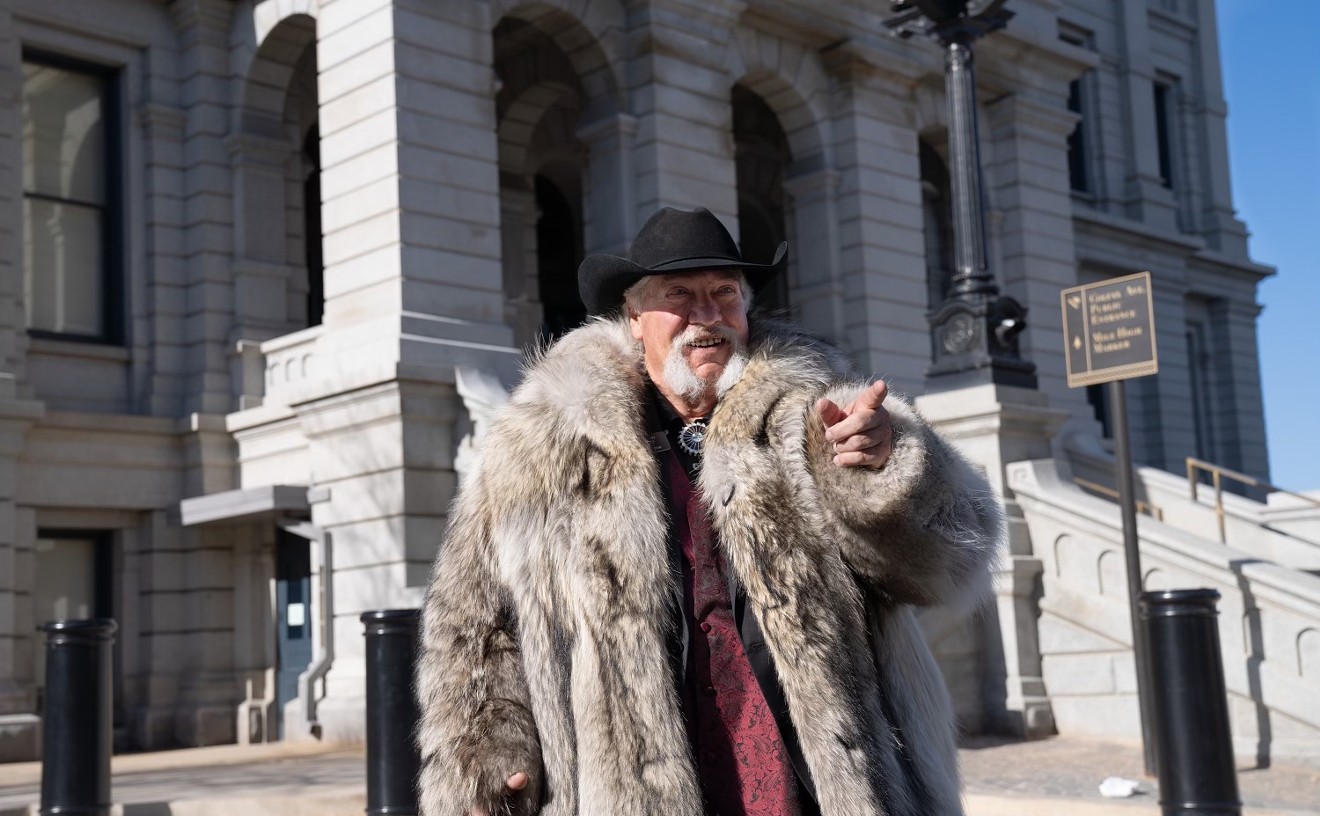So when a girl of that dangerous age approaches the courtroom pedestal on her third speeding charge, the magistrate's shoulders slump dejectedly. "Is this really your third offense?" he asks. She nods. He sighs. "Not off to a real good start, are ya?"
Her mother's careful coaching clearly did not include a section on witty courtroom banter, so she smiles shakily, tries to look remorseful and says nothing. He tries another tack: "Have you taken driver's ed?" Fairly certain this is not a trick question, she answers affirmatively. "Well," he responds, "since it didn't seem to do you much good, you get to take it again."
Welcome to Magistrate Robert Gilbert's traffic court. It may well be the best one-man show in Denver -- albeit one with a fairly steep cover charge. Front-row seats for the 4:30, 6 and 7:30 p.m. performances average about a hundred bucks a ticket -- except for those unlucky souls who fall prey to Gilbert's deadpan opening line: "I'll reduce that to a one-point violation and fine you $600." He waits a full three beats, watching his victim's jaw drop slack, before chuckling and amending his verdict with "Just making sure you were paying attention."
On any given night, a cornucopia of characters present themselves to the courtroom: businessmen, Army officers, pimps, housewives, sensitive ponytail guys, sneering teenagers with their pissed-off parents and the occasional random spectator who, à la Ally Sheedy in the Breakfast Club, has nothing better to do. Traffic court is the great American equalizer. At least 50,000 Denverites pass over its threshold each year, explaining away everything from not having insurance to doing sixty in a forty.
"We get millionaires, and folks who couldn't rub two nickels together," says court administrator Matthew McConville. His eyes twinkle. "But they all drive."
And if they're lucky, when they cross paths with Johnny Law and their heinies land in court, they find themselves in City and County of Denver Courtroom 105A, the Honorable Magistrate Gilbert presiding.
"For most people, it's the only time they have interaction with the court system, so if you can make it more pleasant, it's well worth it," says Gilbert, one of thirteen Denver magistrates. "If there's some humor, they find out you're human, and that makes it easier for everyone. Easier...and a lot more fun for me. Besides, if you can't have fun with what you're doing, you shouldn't be doing it, no matter what it is."
When Gilbert started in Denver County as a part-time night-court magistrate just over a year ago, he had big shoes to fill. His well-loved predecessor, Paul Quinn, was best known for witty one-liners. When Quinn once asked a young man whether he had a driver's license, the defendant replied that he was "working on it." "Working on it?" Quinn quipped. "As in you're making it in your basement?"
Mike McSpadden, a wry court technical clerk, knows all of the stories and happily recounts the Magistrate Chronicles. "There's a few of them that bring humor to the courtroom. It's definitely a certain type of personality," he says. "There's also Magistrate Muller. He's a real card, too. He used to do traffic court as well." Glancing at a schedule, he adds, "Although now I think he's over in dog court." Dog court? "Yeah, we get some dogs that are pretty bad drivers." Ba-dum-dum.
Everyone in traffic court thinks he's a comedian. It's Gilbert who headlines.
He's been a lawyer for nearly thirty years -- he worked in Illinois and Texas before eventually returning to Colorado, the state of his birth, twenty years ago -- but he wanted to try life from the other side of the bench. So four years ago, when a magistrate slot opened up in Eagle County, Gilbert jumped at the opportunity. It's a long drive from his Arvada home, but he "gets to fish, so it's worth it."
But when he heard about a position in Denver County last year, Gilbert decided to apply. Unlike judges, who are appointed by the mayor and must ask voters for retention, magistrates are hired by the city's presiding judge, Raymond Satter -- himself a funny guy -- and are members of Denver's Career Service Authority system. Magistrates have the full powers of a judge, except they can't oversee jury trials or sign warrants. Besides that, there's little difference: A man in black is a man in black.
Satter handed Gilbert a gavel, and the court jester has been entertaining delinquent drivers ever since, splitting his time between Eagle and Denver counties. It's a good match, given that Gilbert's passion for fly fishing is exceeded only by his love of cars. His wife, Sue, rattles off the list of vehicles that currently reside at the Gilbert household: "There's his '32 Model A that he built from scratch and a '65 Rover with right-hand drive from England; not too long ago he got a Miata, and his newest baby is a '72 Vespa."
Behind the bench, Gilbert isn't as salty as Judge Wapner, but he has no fewer one-liners, and his courtroom does, at times, bear a striking resemblance to The People's Court.
"There sure are some strange ones. We get everyone you can imagine," he says with a chuckle, "although people without a license seems to be the most prevalent. But there's always an excuse. And it's always an emergency. You know, the old we-needed-cat-food-and-I-was-the-only-one-who-could-drive-because-everyone-else-was-too-drunk.'"
And yet a situation involving 9Lives, a case of PBR and a zero-hour trip to 7-Eleven doesn't even produce the most comedic fodder. That comes from his regulars.
"You get these people who are doing a taste test of the court systems across the nation," clerk McSpadden says. "They come in and say, 'You know, I got a speeding ticket in Kansas, and they only charged me thirty bucks.' And it's like, listen, sweetie, you're not in Kansas anymore." Definitely not, Toto.
In addition to his duty in traffic court, Gilbert handles cases in small-claims court, where, during the daylight hours, he sees more than his share of sleazy landlords, vicious Chihuahuas, irate contractors, jealous ex-lovers and the occasional blabbermouth who'll "go off on some tangent just to get his or her two cents in." Between the two courtrooms, he's developed a following. Or, as Gilbert puts it, the "wackos who just sue everyone for everything."
The repeat appearances make up for the 25 percent of cases a night who are no-shows.
"People are afraid," McConville says. "But the best a citizen can do for himself when they come to court is just that: come to court. Otherwise this simple traffic matter just gets horrible. You get a warrant; you get thrown in jail. It saves everybody money when we're not jailing people for minor offenses. For your garden-variety speeding ticket, please come to court. We're nice. We understand you didn't commit a murder." His tone approaches pleading. "Please come to court. Just come to court."
Besides, it's a chance to watch justice at work. And while it's common knowledge that justice is supposed to be blind, it also appears to have gotten a D- in algebra -- at least in traffic court.
The elaborate arithmetic of the plea-bargain system makes sense only to those on the inside and leaves traffic newbies a bit baffled. A six-point speeding ticket becomes a three-point charge of "driving too fast for conditions," or a four-point speeding is often reduced to a two-point "operating a defective vehicle." And for anyone who's walked away from the bench with that penalty, Gilbert explains what "defective vehicle" actually means: "Oh, you know, no taillights, no brakes..." And yes, he does get the slightly spooky irony that driving without brakes is a lesser infraction than going 45 in a 30.
When one defendant was asked how he'd plead if he had his four-point speeding reduced to a two-point "failure to signal," he reluctantly pleaded guilty to the charge, saying, "I didn't even know I was turning." Gilbert doesn't miss a beat. "You weren't."










